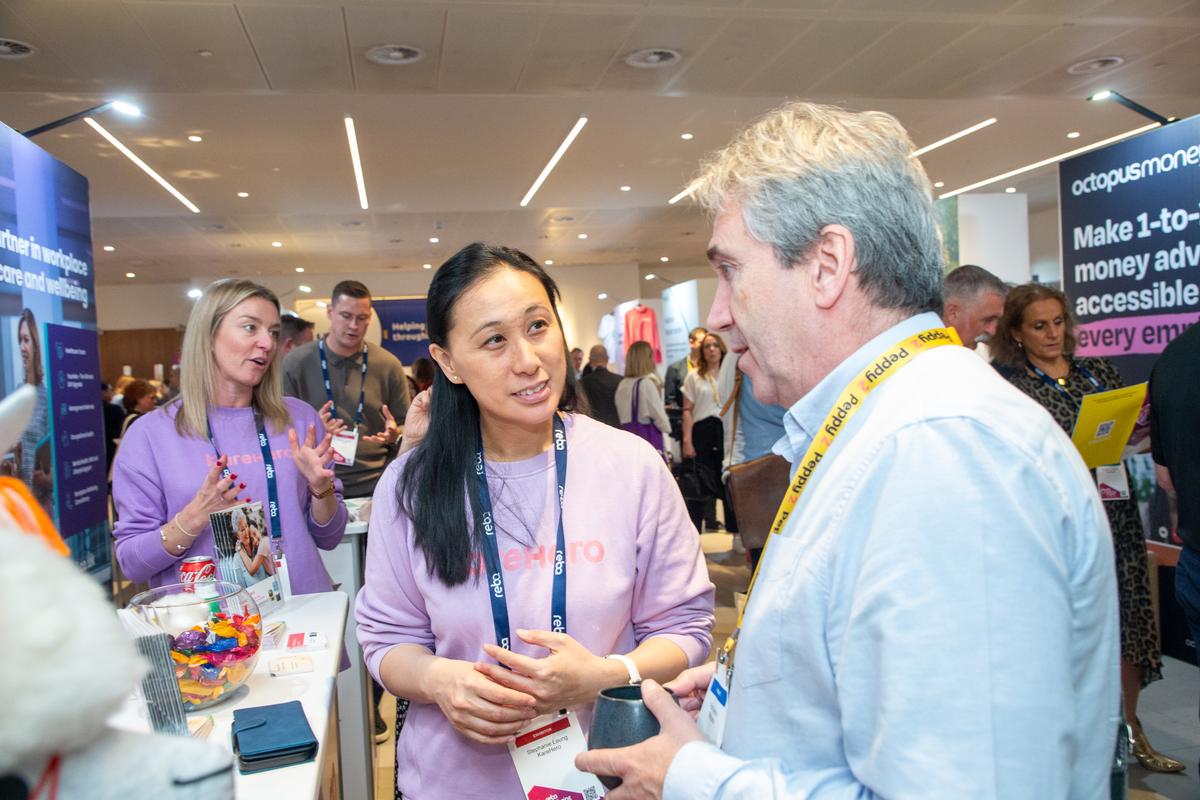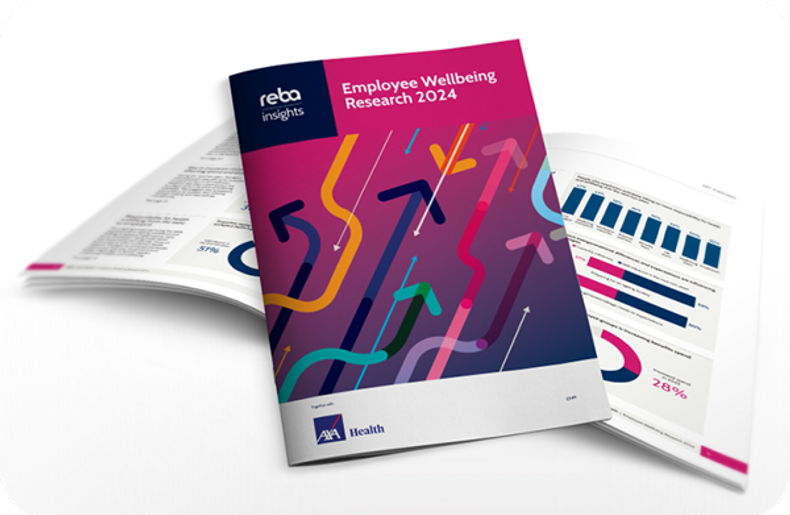The REBA Wellbeing Congress returned for the ninth time on 20 June. With more delegates, speakers and exhibitors than ever before, it continues to attract the leading names in the reward and benefits industry. It has become a key date in the calendar, a vital chance to meet, discuss and share the most pressing challenges facing workplace wellbeing.
Alongside the speaker sessions, masterclasses and roundtables, the exhibition is an integral part of the day. It is a vital opportunity for reward and benefit professionals to connect with partners who can bring their wellbeing strategies to life and for providers to share their latest thinking and innovations.
Here are five themes that emerged from this year’s exhibition.
1. Meeting face to face is more crucial than ever
People like to do business with people. So many exhibitors, from Aviva and GoJoe to Tusker and WTW, told us Congress provides them with a great opportunity to engage with their existing clients and bring them up to date with new developments and introduce them to additional products and services. Delegates at the event are focused on enhancing their wellbeing provision, so it’s a fantastic chance to speak to them away from the distractions of their day-to-day role, when they have a positive mindset.
Customers also enjoy meeting those that may not work on their account to give them a different perspective on their partner and a more rounded sense of who they are as a business. There’s a chance to have a broader discussion, build a rapport and find out information that may be revealed in a more formal, structured environment.
Danielle Shillaker at Epassi also mentioned that people they had tried and failed to connect with on LinkedIn were open to starting a conversation at Congress as they came with the express purpose to meet and talk to suppliers.
2. Harmonisation across organisations and countries is a huge challenge
Creating fairer, more inclusive workplaces has been an ambition for many over the past few years. Making that happen, especially for large, multinational organisations is an ongoing challenge that many delegates are finding it hard to achieve.
For example, employees increasingly want and expect their employer to step in to provide access to health professionals when they need it. The increase in demand has led to price increases, helping to fuel a greater focus on prevention. More effort is being placed on keeping people healthy rather than treating them once they fall ill. Reward and benefit specialists are looking for solutions which fits with the culture of their organisation, providing essential support within the available budget. The exhibition offered a unique opportunity to explore additional options to traditional private medical insurance. Suppliers like Heka, Simplyhealth and AXA Health found it useful to elaborate on their wider propositions in a much more meaningful way than is possible through a simple online search.
Delegates with global responsibilities are grappling with the additional headache of creating packages that are fair but relevant to local cultural norms and expectations. There is a huge desire to partner with those that both understand the challenge and can deliver the answers, helping to reduce costly and time-consuming administration.
3. Convincing the board to increase benefits spend taking more time
With a general election just behind us and major conflicts ongoing in Ukraine and the Middle East, uncertainty in the economic outlook remains. Many exhibitors, such as Benefex and Aon mentioned the board, and in particular the financial chief, want to see more details on the potential return on investment and more concrete evidence that the new initiative will make a material difference.
Reward and benefit specialists are being asked for more information to justify their recommendations and to get budget sign off. They are looking to suppliers to help them have these conversations, providing the data, insights and case studies that demonstrate the proposition is worth investing in.
Now new working practices, such as hybrid and remote working, are becoming embedded, employers want to take their time to see what employees really need to support them in the modern workplace. They want to make sure any new initiative complements rather than overlaps or jars with their existing package and best meets current requirements.

4. Range of choice can be daunting
The growth in the size of the REBA Wellbeing Congress exhibition has in part been fuelled by the number of new entrants coming into the reward and employee benefits market. Dozens of new suppliers responding to emerging employee needs such as life stage, eldercare and gender-specific support are now available. This year alone, 15 new suppliers were part of the exhibition.
While employers welcome the new options that are available and the chance to provide a more tailored and personalised benefits package, there is a lot to keep up with. Exhibitors like Zest and EBC mentioned that some delegates are feeling overwhelmed by the vast array of choice and not sure how best to progress. They want help to navigate the market to make sure they find the most appropriate and relevant option for their workplace.
5. Help needed turning data into insight
One of the main themes coming out of the speaker sessions was how best to use data to optimise benefits. This was notably addressed in the Gallagher session, where Andreas Hunter warned about the dangers of collecting too much data and then not understanding which indicators are the most important to pay attention to.
From discussions that delegates had around the exhibition this is an issue that is near the top, if not at the summit of their to-do list. Suppliers like WTW and Isio mentioned that delegates have no shortage of data. What they want is guidance on what areas to focus on, what insights are most useful and how they can use it to work smarter.
The new AI propositions demonstrated at the event by Peppy and PwC certainly offer a step forward. Efficient solutions that can reduce laborious administration and enhance the employee experience are hugely welcome. Integrating these with numerous existing systems, cultural norms and generational differences in the workplace, particularly those that have global reach will not be simple. However, there is clearly an appetite to embrace technological advancements and employers want to work with suppliers to turn the possible into the actual.
REBA Employee Wellbeing Research 2024
Many of these themes and others are explored further in the REBA Employee Wellbeing Research 2024, in association with AXA Health. Released at Congress, this comprehensive report examines how and why workplace wellbeing is evolving and the pivotal shift in employee health and wellbeing responsibilities from the state to employers.

